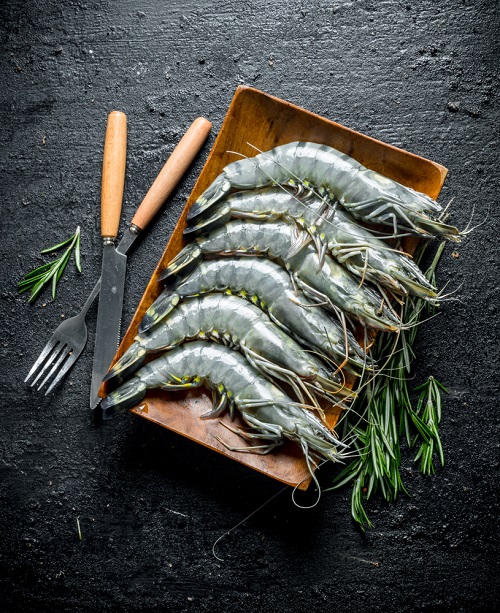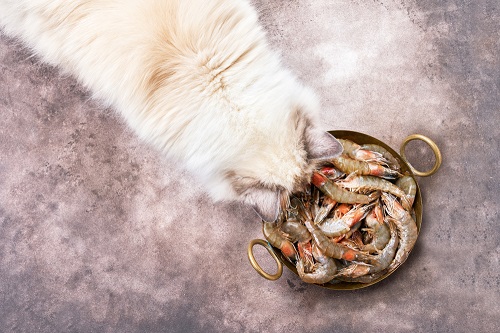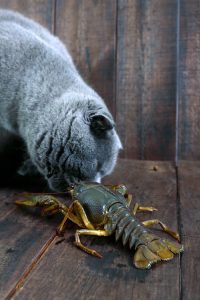Discover if raw shrimp is a safe and healthy treat for your feline friend in our article, Can Cats Eat Raw Shrimp?
If you are a cat owner and a seafood lover, you may wonder if you can share some of your favorite dishes with your feline friend. Shrimp is a popular seafood item that can be found in many dishes, but Can Cats Eat Raw Shrimp? In this article, we will explore the topic of feeding raw shrimp to cats and discuss the potential benefits and risks involved.
Can Cats Eat Shrimp? Find out here
What Is Raw Shrimp?

Raw shrimp refers to uncooked shrimp, which is typically sold in its natural state, without any heat processing. Shrimp is a type of shellfish characterized by their elongated bodies and ten legs.
They are one of the many popular seafoods, known for their sweet and delicate flavor, and are often used in a variety of dishes such as stir-fries, salads, and pasta. Raw shrimp can be eaten by humans and is also used as a popular ingredient in various cuisines.
Can Cats Eat Raw Shrimp?
While cats are obligate carnivores and can eat a variety of meats, it is important to consider the safety and nutritional value of any new food added to their diet. Raw shrimp is not recommended for cats, as it can pose several health risks. It is best to consider cooked shrimp as a treat in moderation.
Is Raw Shrimp Toxic For Cats?
Raw shrimp can potentially be toxic to cats as it may contain harmful bacteria or parasites that can cause serious health issues. Additionally, raw shrimp may contain dangerous levels of mercury and other heavy metals that can accumulate in a cat’s body and lead to long-term health problems.
Does Raw Shrimp Contain Any Nutritional Value For Cats?
Yes, raw shrimp can provide some nutritional benefits to cats, like proteins, fatty acids, vitamins, and minerals. However, it is important to remember that feeding raw shrimp to cats carries potential risks, such as bacterial or parasitic infections.
Risks Of Feeding Raw Shrimp To Cats

- Bacterial infections: Raw shrimp can contain harmful bacteria such as E. coli, Salmonella, and Vibrio, which can cause severe infections in cats.
- Parasitic infections: Raw shrimp can contain parasites such as tapeworms, which can lead to digestive problems and malnutrition in cats.
- Thiamine deficiency: Consuming too much raw shrimp can lead to thiamine deficiency, which can cause neurological problems in felines.
- Allergic reactions: Some cats may be allergic to shrimp, which can cause symptoms such as itching, swelling, and breathing difficulties.
- Choking hazards: Raw shrimp can contain small shells or other parts that can pose a choking hazard or cause internal injuries in cats.
- Mercury poisoning: Raw shrimp can contain high levels of mercury, which can be toxic to cats if consumed in large amounts.
It is important to take these risks into consideration and consult with a veterinarian before feeding raw shrimp or any other raw seafood to your cat.
Signs Of Food Poisoning In Cats After Eating Raw Shrimp
- Vomiting
- Diarrhea
- Loss of appetite
- Lethargy
- Abdominal pain
- Dehydration
- Fever
- Weakness
If your cat shows any of these symptoms after eating raw shrimp, it is important to seek veterinary attention immediately.
Safe Ways To Feed Shrimp To Your Cat

- Always cook the shrimp before feeding it to your cat to eliminate any harmful bacteria or parasites.
- Remove the shell, tail, and digestive tract before serving the shrimp to your cat to prevent choking and digestive issues.
- Cut the shrimp into small, bite-sized pieces to make it easier for your cat to eat and digest.
- Introduce shrimp slowly into your cat’s diet and monitor them for any signs of food allergies or sensitivities.
- Do not feed your cat seasoned or spiced shrimp, as the added ingredients may be harmful to their health.
- Limit the amount of shrimp you feed your cat, as it should not be a primary source of nutrition in their diet.
Can Cats Eat Raw Shrimp? Quick Takeaways!
- So, can cats eat raw shrimp? Well, raw shrimp is not advised for cats, as it can pose several health risks, such as bacterial or parasitic infections, thiamine deficiency, and choking hazards.
- While raw shrimp can provide some nutritional benefits to cats, it is best to consider cooked shrimp as a treat in moderation.
- Symptoms of food poisoning in cats after eating raw shrimp can include vomiting, diarrhea, loss of appetite, lethargy, abdominal pain, dehydration, fever, and weakness.
- Safe ways to feed shrimp to your cat include cooking it before feeding, removing the shell and digestive tract, cutting into small pieces, introducing it slowly, and not feeding seasoned or spiced shrimp.



